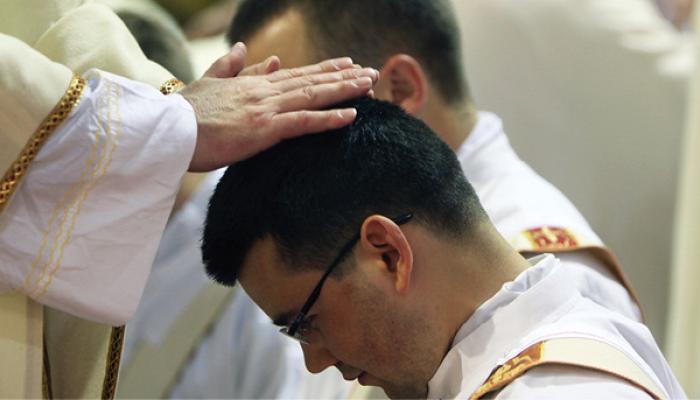
3.39 Si mund të rrëfehem mirë?
Ti mund të përgatitesh duke i kërkuar Zotit që të ndihmojë të kuptosh çfarë është e gabuar dhe mëkatare në jetën tënde. Pastaj shkon te një prift dhe i kërkon bekimin për t’u rrëfyer si duhet. Bën një rrëfim të shkurtër, të plotë dhe të qartë të mëkateve që ke bërë. Pastaj prifti të këshillon dhe të jep pendesën.
Falë aplikacionit #DeoQuest, mund ta gjesh gjithmonë strukturën e rrëfimit; e gjen në pjesën që përmban lutjet për priftërinjtë.
Më pas, prifti të jep zgjidhjen (faljen e Zotit). Në këtë moment, Zoti t’i falë të gjitha mëkatet e rrëfyera me zemër të penduar. Kjo do të thotë se mëkatet tua thjesht janë shlyer dhe se mund të vijosh me jetën tënde si i krishterë.
Cilët janë përbërësit thelbësorë të Sakramentit të Pajtimit?
Janë dy: veprat e kryera prej njeriut, i cili kthehet nën ndikimin e Shpirtit Shenjt, dhe zgjidhja e meshtarit, i cili në Emër të Krishtit jep faljen dhe përcakton mënyrat e shpërblimit. [KKKP 302]
A është i detyruar Rrëfyesi ta ruajë sekretin e rrëfimit?
Duke pasur parasysh rëndësinë dhe madhërinë e kësaj shërbese, si edhe nderimin e duhur ndaj personave, secili Rrëfyes është i detyruar, pa asnjë lloj përjashtimi dhe nën kanosjen e dënimeve shumë të rrepta, të mbajë vulën sakramentore, domethënë të ruajë sekretin absolut mbi mëkatet e dëgjuara në rrëfim. [KKKP 309]
What names are there for the sacrament of Penance?
The sacrament of Penance is also called the sacrament of Reconciliation, of forgiveness, of conversion, or of confession. [Youcat 225]
But we have Baptism, which reconciles us with God; why then do we need a special sacrament of Reconciliation?
Baptism does snatch us from the power of sin and death and brings us into the new life of the children of God, but it does not free us from human weakness and the inclination to sin. That is why we need a place where we can be reconciled with God again and again. That place is confession.
It does not seem like a modern thing to go to confession; it can be difficult and may cost a great deal of effort at first. But it is one of the greatest graces that we can receive again and again in our life—it truly renews the soul, completely unburdens it, leaving it without the debts of the past, accepted in love, and equipped with new strength. God is merciful, and he desires nothing more earnestly than for us, too, to lay claim to his mercy. Someone who has gone to confession turns a clean, new page in the book of his life. [Youcat 226]
Who instituted the sacrament of Penance?
Jesus himself instituted the sacrament of Penance when he showed himself to his apostles on Easter day and commanded them, “Receive the Holy Spirit. If you forgive the sins of any, they are forgiven; if you retain the sins of any, they are retained” (Jn 20:22a–23).
Nowhere did Jesus express more beautifully what happens in the sacrament of Penance than in the parable of the Prodigal Son: We go astray, we are lost and can no longer cope. Yet our Father waits for us with great, indeed, infinite longing; he forgives us when we come back; he takes us in again, forgives our sins. Jesus himself forgave the sins of many individuals; it was more important to him than working miracles. He regarded this as the great sign of the dawning of the kingdom of God, in which all wounds are healed and all tears are wiped away. Jesus forgave sins in the power of the Holy Spirit, and he handed that power on to his apostles. We fall into the arms of our heavenly Father when we go to a priest and confess. [Youcat 227]
Who can forgive sins?
God alone can forgive sins. Jesus could say “Your sins are forgiven” (Mk 2:5) only because he is the Son of God. And priests can forgive sins in Jesus’ place only because Jesus has given them that authority.
Many people say, “I can go directly to God; why do I need a priest?” God, though, wants it otherwise. We rationalize our sins away and like to sweep things under the rug. That is why God wants us to tell our sins and to acknowledge them in a personal encounter. Therefore, the following words from the Gospel are true of priests: “If you forgive the sins of any, they are forgiven; if you retain the sins of any, they are retained” (Jn 20:23). [Youcat 228]
What sins must be confessed?
Under normal circumstances, all serious sins that one remembers after making a thorough examination of conscience and that have not yet been confessed can be forgiven only in individual sacramental confession.
Of course there will be reluctance before making a confession. Overcoming it is the first step toward interior healing. Often it helps to think that even the Pope has to have the courage to confess his failings and weaknesses to another priest—and thereby to God. Only in life-or-death emergencies (for instance, during an airstrike in wartime or on other occasions when a group of people are in danger of death) can a priest administer “general absolution” to a group of people without the personal confession of sins beforehand. However, afterwards, one must confess serious sins in a personal confession at the first opportunity. [Youcat 233]
When is a Catholic obliged to confess his serious sins? How often should one go to confession?
Upon reaching the age of reason, a Catholic is obliged to confess his serious sins. The Church urgently advises the faithful to do this at least once a year. At any rate one must go to confession before receiving Holy Communion if one has committed a serious sin.
By “the age of reason”, the Church means the age at which one has arrived at the use of reason and has learned to distinguish between good and bad. [Youcat 234]
May a priest later repeat something he has learned in confession?
No. Under no circumstances. The secrecy of the confessional is absolute. Any priest who would tell another person something he had learned in the confessional would be excommunicated. Even to the police, the priest cannot say or suggest anything.
There is hardly anything that priests take more seriously than the seal of the confessional. There are priests who have suffered torture for it and have gone to their deaths. Therefore, you can speak candidly and unreservedly to a priest and confide in him with great peace of mind, because his only job at that moment is to be entirely “the ear of God”. [Youcat 238]
Pendohuni dhe do të jetoni!'(Ezek 18:21); dhe përsëri, Ti thuaju: Pasha jetën time ‑ thotë Zoti Hyj ‑ nuk e dua vdekjen e të patenzonit, por dua që i patenzoni të kthehet nga rruga e ligë e të jetojë! Kthehuni, kthehuni nga rrugët tuaja të këqija! E pse të vdisni, o shtëpia e Izraelit!’ (Ezek. 33:11). Pendesa, pra, është 'jetë', pasi pëlqehet më shumë se vdekja. Ajo pendesë, o mëkatar, njëlloj si unë ... a ngutesh kaq shpejt të përqafosh, si një i mbytur, sigurinë e ndonjë dërrase? Kjo do t'ju tërheqë kur të zhyteni në valët e mëkateve dhe do t'ju çojë përpara në portin e mëshirës hyjnore. [Tertullian, Mbi pendesën, Kapitulli 4 (ML 1, 1233)]





